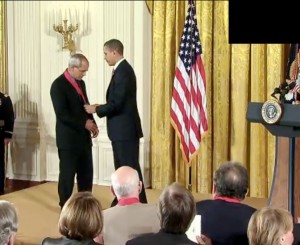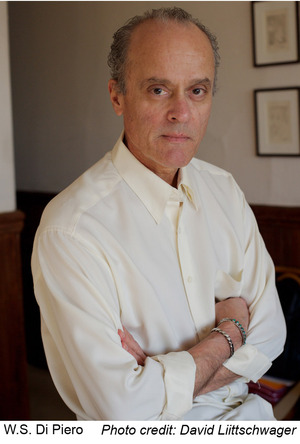Langston Hughes and his thousands of letters
Thursday, April 16th, 2015 I haven’t read much of the work of Harlem Renaissance poet Langston Hughes, but I adore the man already, after reading Arnold Rampersad‘s engaging, straightforward introduction to him in the new Selected Letters of Langston Hughes. The new Knopf volume is the first comprehensive selection of his correspondence, edited by Rampersad, winner of the National Humanities Medal (we’ve written about him here and here and here) and David Roessel, with Christa Fratantoro.
I haven’t read much of the work of Harlem Renaissance poet Langston Hughes, but I adore the man already, after reading Arnold Rampersad‘s engaging, straightforward introduction to him in the new Selected Letters of Langston Hughes. The new Knopf volume is the first comprehensive selection of his correspondence, edited by Rampersad, winner of the National Humanities Medal (we’ve written about him here and here and here) and David Roessel, with Christa Fratantoro.
Hughes and I both have a complicated relationship to the world of letters. As he put it, it’s not the writing, but the “getting down to writing” that’s the problem. Here’s the first paragraph of Rampersad’s introduction:
“Who knows better than I,” Langston Hughes once wrote to a friend, “what letter writing entails?” Certainly he knew much about letters. With a crowded life that put him in touch over the decades with thousands of people, the mail was crucial to starting and keeping friendships and to doing business. He admired people who answered letters promptly. His friend Carl Van Vechten, for example, received a flood of mail but usually answered each piece on the day it reached him. Hughes was not so disciplined. In fact, at one point he called himself “the world’s worst letter writer.” Another time, he confessed to stuffing away a swelling pile of answered pieces. “Two drawers are full,” he noted, “so I’m moving my sox over.” All the same, he wanted to be a faithful correspondent. “I leave you now,” he ended a letter in 1944, “to consider the stack of mail on top of mail piled on the bed. I cannot take my rest until I unpile some of it.”
I can sooo relate. Rampersad continues:
Later in life, living near one of the noisier sections of Harlem, he wrote through the night, when the brownstone row house he shared was likely to be quiet. Then, at three or four or five o’clock, or even later, he sat at his typewriter and pounded out letters (more than thirty on many nights) that went all over the world. This was in addition to writing the poems, novels, short stories, plays, autobiographies, histories, translations, opera libretti, song lyrics, children’s books, and newspaper columns, as well as editing anthologies and other volumes, that made so many people long to be in touch of them.”
As early as 1923, Hughes wrote an early letter to Countee Cullen, “Certainly it is very kind of you to offer to read my poems for me at the library and very beastly of me not to have written a single line since returning from New York.” He was already behind in his letter-writing. But that was the least of his problems.
About two decades ago, I remember reading the letters of Katherine Mansfield, and the dominant theme of the letters was: money. Constantly short of cash as she coughed the last of her life in resort towns to relieve her tuberculosis, as she wrote, wrote, wrote … letters, diaries, short stories. Francs, dollars, yen … At least that seems to be one eternal part of the equation, and Hughes was no exception.
Did you ever try livin’
On two-bits minus two?
I say did you ever try livin’
On two bits minus two?
Why don’t you try it, folks,
And see what it would do to you?

Thousands of letters, and he edited them.
The new volume opens with the early beseeching letters to father in 1921, after he published his first poem, “The Negro Speaks of Rivers,” in a national magazine. The humiliating financial exigencies were an ongoing condition. He wrote to his publisher Blanche Knopf, from a Mexican house above a pear orchard in Carmel Valley as he wrote his long (and somewhat premature) autobiography in 1939: “The house is entirely my own for work, and as remote and quiet a place as one would want to find, so I shall not be interrupted. I am sorry the manuscript is not ready to send you now, as I had hoped it would be, but it is going along splendidly and is two-thirds finished, so a month more of steady work should get it done. However, my difficulty at the moment is this: having turned down all lectures for this fall and put aside everything else in order to get the book done, my sources of income have temporarily ceased – and I find myself with an eviction warning from my New York landlord if I do not come through with the August rent. Which is bad enough, but not quite as bad as being unable to employ a typist to assist me in preparation of a final draft – some five hundred pages – which I shall shortly have ready to have recopied. So much as I dislike to do it at this stage of the game, I am writing to ask you if it would be possible to now allow me an advance of $200.00 on the book…” He lived in a time, you see, when $200 was more than a spit in the bucket.
Some things don’t change, even with fame. He wrote to Van Vechten in 1955: “What I was about to write you abut you about yesterday was (and is) to ask you if by any chance you’ve got a spare hundred lying around loose anywhere you could lend me for a month. Brokeness suddenly descended upon me unawares and my stenographer’s last check bounced. Turned out I was $1.48 short! … I don’t mind being broke myself, but typists live more hand to mouth than author, and I don’t want to get more than a week or two behind with her…” Working on a film project in 1940, he wrote that he had been “entangled in that unprofitable thing known as the show business,” adding that “in this charming democracy of ours there seems to be no place for Negroes to live in Hollywood even if they do work out there occasionally.”
Thousands of letters. We’re grateful they haven’t disappeared over the years – including letters to Richard Wright, James Baldwin, Ezra Pound, Wole Soyinka, Rev. Martin Luther King. Although, in a 1936 letter, he wrote, “I seem to be out-doing even myself as the world’s worst letter writer,” his correspondence is so huge that it could easily fill a score of large volumes. But then, he saved everything. “I guess I never throw anything away ever,” he admitted.






 Poet
Poet The Guggenheim will give her time to work on her new book, The Book Madness: Charles Lamb’s Midnight Darlings in New York, a study of 19th century bibliomania, the formation of important libraries and literary culture in America, and the half-forgotten English essayist Charles Lamb.
The Guggenheim will give her time to work on her new book, The Book Madness: Charles Lamb’s Midnight Darlings in New York, a study of 19th century bibliomania, the formation of important libraries and literary culture in America, and the half-forgotten English essayist Charles Lamb.

